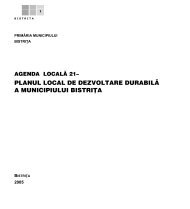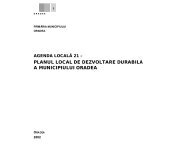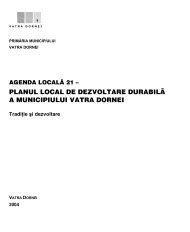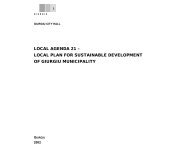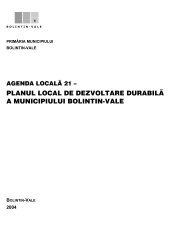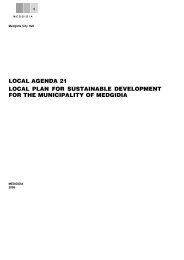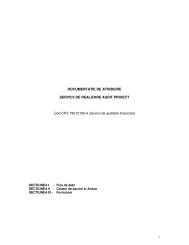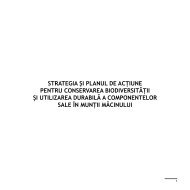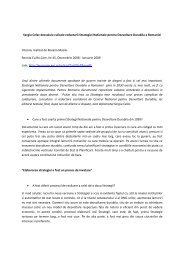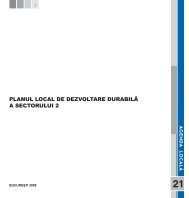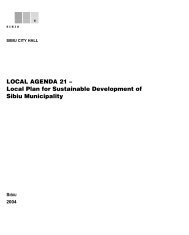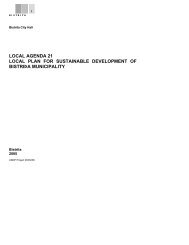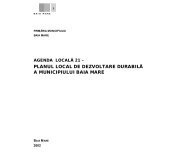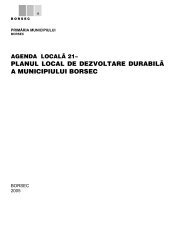English Version - United Nations Development Programme Romania
English Version - United Nations Development Programme Romania
English Version - United Nations Development Programme Romania
You also want an ePaper? Increase the reach of your titles
YUMPU automatically turns print PDFs into web optimized ePapers that Google loves.
f) Savings and investing are discouraged. During the transition period, the economic capacity<br />
of ensuring a capital accumulation rate high enough to support the restructuring and reforms along the<br />
lines of efficiency and competitiveness was extremely low and varied considerably. The ratio between the<br />
savings rate and public spending has been sinking continuously, from over 24% in 1991 to less than 10%<br />
in 1998, which is mostly due to a decrease in savings and in the privatisation of state-owned enterprises.<br />
Gross generation of fixed capital The average investment rate, represented as gross generation of<br />
fixed capital in the GDP (the accumulation rate) is very low, with large variations from year to year<br />
for an economy subjected to massive restructuring, a situation that also limits investments in<br />
environment protection. Accordingly, net investments are also reduced, due to inefficient structural<br />
changes. Compared to 1989, the volume of net investments in 1997 was 52.8%.<br />
Table 2.5<br />
Rate of FCGA in GDP, 1990-1998 (%)<br />
1990 1991 1992 1993 1994 1995 1996 1997 1998<br />
19.8 14.4 19.2 17.9 20.3 21.4 23.1 22.0 18.1<br />
Source: The National Commission for Statistics, 1998<br />
g) Health and durability of the economy also depend on the quantity of resources that can be<br />
invested in the protection of the environment. In <strong>Romania</strong>, in 1997, total spending on the protection of the<br />
environment was of lei 3,661,575 billion, which is 1% of the GDP, whereas in the developed countries<br />
this proportion is almost twice as much. These spendings on various activities are presented in table 2.6.<br />
During the last few years the spending for environment protection followed a downward trend, in direct<br />
relation with the decline in investment.<br />
The evolution of the main macro-economic aggregates has been in a permanent deadlock. The<br />
various mechanisms involved in the process were insufficiently co-ordinated and approved, which caused<br />
negative repercussions. Therefore, the economic reform became costly, with regard to the consumption of<br />
resources and to the compliance of production to market demand; the burden of the structural heritage -<br />
especially in industry - severely increased the cost of transition. From a human development perspective,<br />
the evolution of the economy was unsustainable, inflationary, impoverishing and showed a high degree of<br />
vulnerability, which is still growing for a significant part of the population.<br />
Table 2.6<br />
Environment protection spending according to activity sectors in 1997<br />
Activity sectors<br />
Total<br />
Pollution<br />
prevention<br />
and fighting<br />
Natural<br />
environment<br />
protection<br />
Research,<br />
development,<br />
education<br />
General<br />
environment<br />
management<br />
Total: 3,661,575 3,236,220 254,479 79,818 88,040<br />
Agriculture 57,994 16,431 41,244 15 304<br />
Forestry 51,979 147 51,776 53 3<br />
Extractive industry 267,465 181,551 44,094 35,734 6,086<br />
Processing industry 936,270 900,811 1,841 6,433 27,185<br />
Waste recycling 232,239 232,150 4 20 65<br />
Thermal and electric energy,<br />
natural gas industry 1,473,967 1,391,769 68,583 6,333 7,282<br />
Transports 69,430 62,473 1,893 4,302 762<br />
Public administration 108,098 25,060 33,867 3,319 45,852<br />
Waste collection and<br />
elimination, scavenging 361,928 361,854 50 22 2<br />
Scientific research 32,954 8,584 3,436 20,634 300<br />
Other sectors 69,251 55,390 10,709 2,953 199<br />
Source: the <strong>Romania</strong>n Environment Report, 1998 Edition; National Commission for Statistics.<br />
Moreover, this negative development has caused a marginalisation of the <strong>Romania</strong>n economy in<br />
the European context, which leaves it in a critical situation. In the absence of a new concept and of a<br />
short, medium, and long-term global strategy, <strong>Romania</strong> is moving away from the aims of sustainable<br />
development.<br />
2.4 Conservation of energy resources<br />
18



